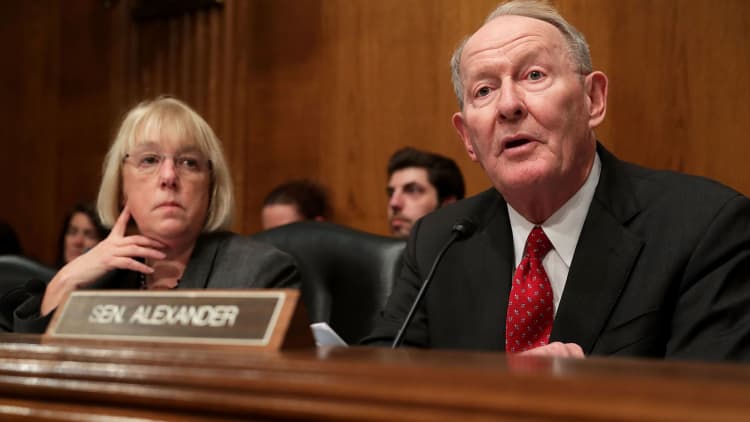A bipartisan Senate bill that seeks to restore key federal payments to Obamacare insurers "would not substantially change" the number of Americans with health insurance, the Congressional Budget Office said Wednesday.
The Alexander-Murray bill also would cut the federal deficit by $3.8 billion over the next decade, the CBO said in a report analyzing effects of the bill.
And it would result in "slightly lower premiums" that currently projected for many Obamacare plans, according to the CBO, a nonpartisan agency.
The bill was introduced in the Senate on the heels of the Oct. 12 decision by the Trump administration to terminate payments known as cost-sharing reduction reimbursements to Obamacare insurers.
The billions of dollars worth of payments compensate insurance plans for discounts that they must — by law — offer low-income Obamacare customers for their out-of-pocket health costs.
The CBO earlier projected that killing those payments would lead Obamacare plan premium prices to be 25 percent higher in 2020 than they would have been if the payments continued.
Prices for next year are estimated to be about 20 percent higher than they otherwise would have been because of President Donald Trump's threats since early 2017 to end the CSR payments.
The CBO also had earlier estimated that ending the payments would actually increase the federal deficit by almost $200 billion over the next decade.

That is because while the government would be saving billions of dollars from not making the CSR payments, it would have to spend significantly more on Obamacare premium subsidies for customers because of the decision.
Those premium subsidies rise in value as plan prices increase. About 6 million people currently get CSR discounts.
The Alexander-Murray bill would continue the CSR payments to insurers for the next two years.
The bill also would grant individual states additional flexibility in what kind of health plans could be sold in those states. And the bill would allow people of all ages to buy "copper" health plans, which are cheaper and less comprehensive than other Obamacare plans.
The bill also would increase spending for outreach to encourage enrollment in health insurance plans.
Trump has given mixed signals on the bill created by Sens. Lamar Alexander, R-Tenn., and Patty Murray, D-Wash., which has 24 co-sponsors split among Republicans and Democrats.
The president has said he is opposed to a "bailout" for insurers. But according to Alexander, Trump also has encouraged him to work on a bill that would provide a short-term fix for Obamacare marketplaces.
House Speaker Paul Ryan, R-Wis., has said he is opposed to the bill. For it to become law, it needs to be approved by the Senate, the House and by Trump.
In a joint statement issued Wednesday after the CBO report, Alexander and Murray said, "This nonpartisan analysis shows that our bill provides savings and ensures that funding two years of cost-sharing payments will benefit taxpayers and low-income Americans, not insurance companies."
"CBO has also told us that if CSRs are not paid, premiums in 2018 will go up an average of 20 percent, the federal debt will increase by $194 billion over ten years, due to the extra cost of subsidies to pay the higher premiums, and up to 16 million Americans may live in counties where they are not able to buy any insurance in the individual market," the two senators said.
Brad Woodhouse, director of the Obamacare advocacy group Protect Our Care Campaign, said, "Today's CBO report only reinforces that passing Alexander-Murray is a no-brainer."
"If the reasons Alexander-Murray has gained such strong bipartisan support in the Senate weren't clear before, they certainly are now," Woodhouse said. "It's time for President Trump and House and Senate Republican leaders to get on board and do the right thing for the American people by passing Alexander-Murray without delay."
On Tuesday, Sen. Orrin Hatch, R-Utah and Rep. Kevin Brady, R-Texas, proposed their own bill to fund the CSR payments.
That bill would link anti-abortion restrictions to the restoration of the CSR reimbursements.
It also would, among other things, suspend enforcement of Obamacare's individual mandate through 2021. That mandate requires most Americans to have some form of health coverage or pay a fine.
The Hatch-Brady bill has not yet been analyzed by the CBO.
WATCH: Senators reach deal to short up Obamacare markets




